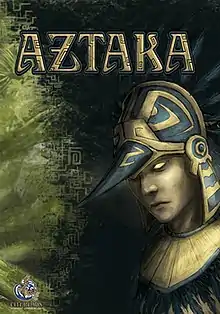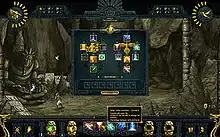Aztaka
Aztaka is a 2D side-scrolling action role-playing video game for the Microsoft Windows and OS X developed by Canadian independent game developer Citérémis.[2] The game is set in the Aztec period, with characters and story being re-interpretations of Aztec mythology and pre-Hispanic Mexican culture. It puts the player in the role of an Aztec warrior named "Huitzilo" who must gather seven phonographs to save his civilization from its angry gods.
| Aztaka | |
|---|---|
 | |
| Developer(s) | Citérémis |
| Publisher(s) | Citérémis |
| Platform(s) | Microsoft Windows & OS X |
| Release | May 7, 2009[1] |
| Genre(s) | Action role-playing game, Metroidvania |
| Mode(s) | Single-player |
Gameplay

The gameplay is reminiscent of an old-school action role-playing game. The player climbs, crawls and jumps his way around a level to explore it and find new items. Experience points are gained for every enemy killed, and they are spent to upgrade the character's attributes and special skills.[3] There is also an inventory screen where discovered items can be equipped and where merchandise bought from merchants (like potions) can be used.[4]
The game is controlled with the WASD keys (makes Huitzilo move and jump) and the mouse (to attack or grab items).[5] Doing this allows the player to modify parts of the game world, as well as unlock a variety of doorways or pick-up previously unattainable items.[6] As the player progresses in the game, he gains containers that allows him to store on-screen energy particles for later use. The mouse is also used to cast spells, both offensive and defensive, by selecting them from the bottom-screen magic inventory and then clicking at on-screen targets in succession to launch them.[7]
Artwork throughout the game reflects historical Mesoamerica, with square-shaped pyramids, stone temples, mystic engravings, dense jungles, and barren mountaintops. The game's musical score features vocals, flute, cello, organ, and drums.
History
The game was released as DRM-free digital self-distribution on the developer's website and on Direct2Drive in May 2009.[1] Later in 2009 the game also launched on Steam.[8] In 2011, Citérémis offered a "Developer's Edition" for a limited period of time (7 to 31 January 2011).[9] This edition included the source code of the game, as well as the Art book and soundtrack.[10]
Reception
The game was received by press and game news websites overall good to mixed.[11][12] It was mentioned in an article about indie game development in Italian magazine The Games Machine.[13]
References
- "Aztaka Release Date". Citeremis. May 7, 2009. Archived from the original on 2010-02-17. Retrieved February 25, 2019.
- Otten, Rick (September 30, 2013). "Metroidvania: Game Design 101". IGN Benelux. Retrieved July 13, 2016.
Ook in het Westen hebben Metroidvania-fans echter niet stilgestaan. Zo was Aztaka bijvoorbeeld een erg interessant spelletje...
- Clark, Adam (September 10, 2009). "Indie Game Round-Up [Sept 2009 Edition]". Game Tunnel. Archived from the original on 2010-03-16. Retrieved February 25, 2019.
- Arsene, Adrian (February 17, 2010). "Aztaka - The Untold Aztec Story". Softpedia. Retrieved May 18, 2019.
- Stone, David (June 23, 2009). "Aztaka Review". Gamezebo. Retrieved February 25, 2019.
- Pride, Franklin (March 22, 2013). "Aztaka". Inside Mac Games. Retrieved May 18, 2019.
- Ting, Andrew (January 16, 2011). "Aztaka: brilliant game, poor marketing?". Gamasutra. Retrieved May 18, 2019.
- "AZTAKA, A NEW SIDE-SCROLLING RPG, RELEASED ON STEAM". IGN. November 5, 2009. Retrieved February 25, 2019.
- "CITEREMIS RELEASES AZTAKA DEVELOPER'S EDITION". Citeremis. January 10, 2011. Retrieved February 25, 2019.
The idea was simple: craft a 2D side-scrolling game for the people who loved the old-school genre. The budget: $235,000 borrowed from friends and family who trusted them.
- "Developer's Edition launched to spearhead quest for profitability". Gamershell. January 10, 2011. Retrieved February 25, 2019.
- Voloshin, Kirill (July 30, 2009). "Aztaka". Igromania. Retrieved February 25, 2019.
- "Test : Aztaka". Jeuxvideo.com. June 19, 2009. Retrieved May 19, 2019.
- Turrini, Roberto (May 10, 2013). "The Games Machine 284". Web Archive. Retrieved February 25, 2019.